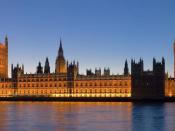The British political system is a complex and challenging concept to analyze and understand. The only way to achieve this, is to distinguish between each part of the system, beginning with the 'constitution'. Following this, a description into the characteristics of the executive branch of the constitution and finally the legislative branch.
The most established definition of a constitution refers to the embodiment of a document(s) detailing the most dominant laws which authenticate the structure of government of the country in question. Also a constitution can state the rights and requirements of the people within a country/state, i.e. who can vote, stand for parliament etc. A constitution may contain formal limitations on the power of government; a well known example of this is the U.S. Bill of Rights, which is the first ten amendments to the American Constitution.
It can be said that a constitution can administer legitimacy throughout the system by defining the powers of government and the rights and responsibilities of the people.
It also appoints, controls and restricts (where necessary) authority within a country.
However, in Britain, the constitution is uncodified. This means that there is not one document that details the features of the constitution. The British constitution can be said to exemplify the judgments and knowledge of past rulers, political ambassadors, etc and to be the product of experience rather than perception, "...was never invented or designed but just grew, so that political facts became constitutional rules." (Madgwick & Woodhouse, 1995:11,18)1 However, it has been accused of being an 'elective dictatorship' by former Lord Chancellor Lord Hailsham, "The sovereignty of Parliament has increasingly become, in practice, the sovereignty of the Commons, and the sovereignty of the Commons has increasingly become the sovereignty of the government which, in addition to its influence in Parliament, controls the...



Good
This essay helped me a lot when i used it as reference.
0 out of 0 people found this comment useful.